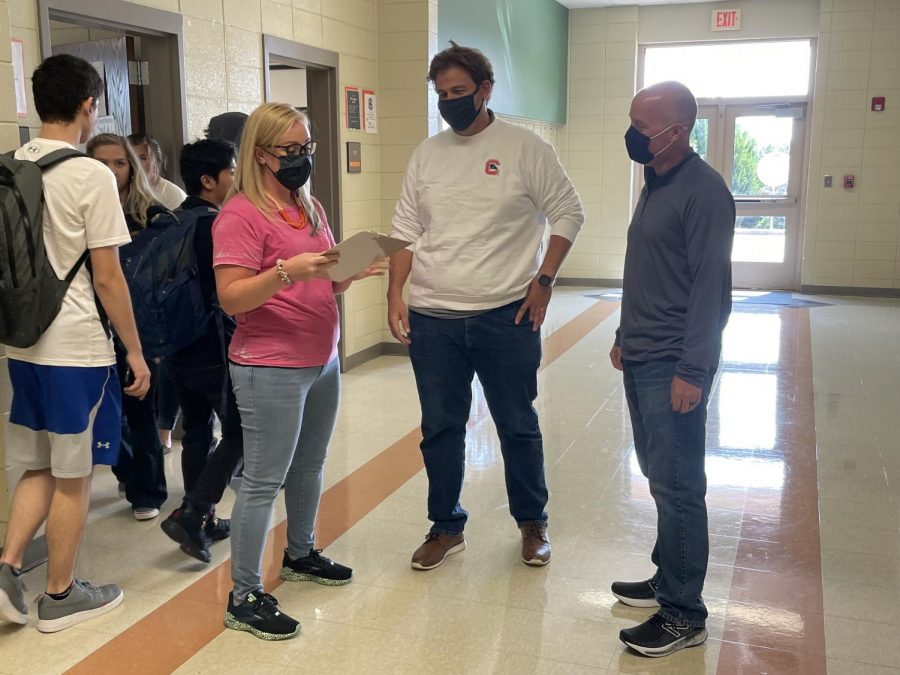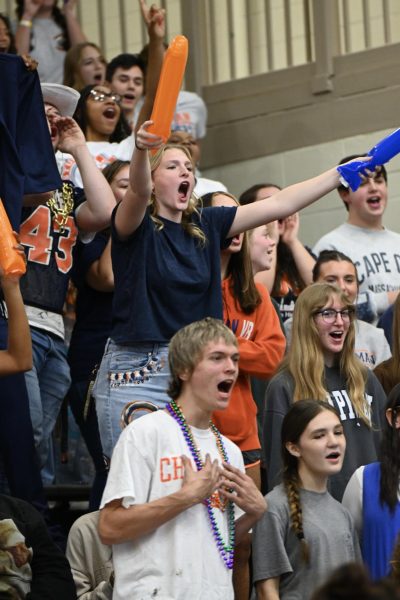Surviving a crisis: Chapman perseveres in the face of national teacher shortage
English teachers Erin Smith (left), Andy Lopez and Alex Hollis chat between classes. The strong professional relationships among faculty members have helped Chapman avoid the teacher shortages currently facing the nation.
“It’s gotta be made a priority for the nation to understand that the institution of public schools can’t continue, or at least the way we expect it to if it’s understaffed,” said English teacher Alex Hollis.
For years now, the demand for teachers has steadily increased while the supply has dwindled.
According to the U.S. Bureau of Labor Statistics, more than 270,000 teachers are expected to leave the profession each year from 2016-2026.
This becomes a problem when there aren’t teachers available to fill the vacancies.
Teacher demand exceeded supply for the first time ever in 2019, according to the Learning Policy Institute.
“There’s just not a lot of people going into the field of education and that really hurts,” said Chapman Principal Andrew Mcmillan.
In 2018, fewer than 160,000 students completed teacher preparation programs according to the Center for American progress.
There are a variety of reasons why enrollment is so low in teacher preparation programs, one of them being the expenses that come with a college education.
According to the National Education Association, educators borrowed an average of $55,800 and owe an average of $58,700 because of low salaries and high-interest rates. This is a challenge in a profession not known for its high pay.
In the 2019-2020 school year, public school teachers in South Carolina averaged $51,485, according to data from the National Center for Education Statistics.
“I’ve never met anyone in this profession who’s in it for the money,” said English teacher Erin Smith.
According to SC for Ed, a South-Carolina based teacher advocacy group, there were 1,612 teacher vacancies in South Carolina as of Aug. 7, the last date on which the data was updated.
Despite all of the adversity, Chapman hasn’t really felt the effects of the national teacher shortage.
“There are definitely some things we could do better to try and keep pace, but fortunately we just don’t have the need that other schools have for teachers’ said Mcmillan.
Educators and administrators at Chapman seem to share the same beliefs on why Chapman has preserved through this crisis.
“There is a community feel here, so you find your niche, and a lot of people do stay,” said math teacher Beth Morin, who has been teaching at Chapman for 24 years.
Chapman is a relatively small school with only around a thousand students, something that is attractive to some teachers.
“I went to Dorman, and so I was kinda used to the big school feel, but when I came to Chapman as a student-teacher I just fell in love with the idea of being able to know everybody,” said Hollis.
Chapman is also the home of many teachers and administrators.
“I came back to this because it’s my home. This is just a great place to be and a great place to work,” said Assistant Principal Ricky Pace, a Chapman graduate who returned early in his career to teach biology and eventually enter administration.
One defining aspect of the faculty at Chapman is the relationships between and among teachers. Students have taken notice of the strong relationships.
“The teachers here have good relationships with each other because they communicate outside of school and are actual friends instead of just coworkers,” said senior Elizabeth Maloney.
Although Chapman hasn’t felt the effects of the teacher shortage, educators and administrators have some ideas on how to deal with his complex issue.
“In a lot of states teachers are unionized; they don’t do lunch duties and afternoons without extra pay. You know, here it’s just part of the job,” said McMillan.
South Carolina is a right-to-work state, meaning there are no unions. That doesn’t mean the idea is unsupported at Chapman, though.
“The more support we can provide them the better,” McMillan said.
Some educators believe that a key to recruiting new teachers lies in the current school system — the teachers themselves.
“I think if you ask any teacher here why they’re a teacher, it’s because a teacher impacted them,” said McMillan.
Smith believes that teaching empathy, something she believes her colleagues display regularly, plays a big role in boosting interest in teaching careers.
“You’re gonna have to appeal to kids who want to see their communities be better,” said Smith.
Despite all of the challenges facing educators in 2021, Smith said that ultimately, the reason Chapman’s teachers continue to show up and do their job well is simple:
“We do it because we love our jobs.”
Your donation will support the student journalists of Chapman High School. Your contribution will allow us to purchase equipment and cover our annual website hosting costs.







